The Humble Bundle store, where charities benefit from the sale of affordable collections of games, has been a staple of the PC scene since its launch by Jeff Rosen and John Graham in 2010. It’s evolved since then, of course. The pair sold to Ziff Davis in 2017, for example, and then in 2020, Humble Games was launched, making the outfit a bona fide games publisher.
New Executive Vice President and General Manager Alan Patmore is behind the latter move. He joined the company with big ideas in 2019, just before the pandemic. A veteran of games development, he’s had 20 years of experience, with senior roles at Surreal Software, Double Fine and Zynga. But whether it’s the types of games on offer today, or its charitable mission, Humble seems a far cry from the free-to-play Zynga days. Was this a deliberate gear shift?
PCGamesInsider.biz grabbed some one-on-one time with Alan Patmore last month at Gamescom in Germany and quizzed him on the journey he, and Humble, is on.
PCGamesInsider.biz: Please tell us a little bit about you and your background. You’ve had a long relationship with games...
Alan Patmore: I originally started in gaming back in 1995. I founded the company Surreal Software, which was best-known for the PC game Drakan. Then there was the Suffering franchise, which we worked with Midway on. Midway purchased Surreal in 2004. We worked with them on some other games – a sequel for Suffering, and a game called This Is Vegas, which never saw the light of day [laughs]. And then, when Midway went bankrupt, they sold a bunch of the assets to Warner Bros.
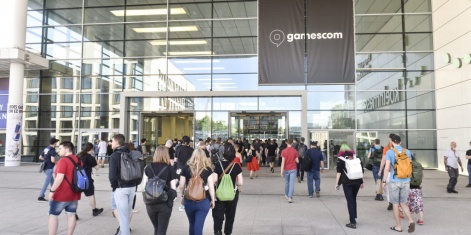
I decided to move on and try something new. So I got hooked up with Tim Schafer at Double Fine, and I was VP of Product Development for Tim when they had just come off Brutal Legend. We wanted to break into four or five smaller teams and work with creatives on innovative projects. I led that transformation of the studio from a single, big AAA studio, to working on these smaller projects.
About two years into working at Double Fine, I met Zynga, which was pre-IPO. They were exploding. I was in the Bay Area, and it was kind of a hot time. I was interested in the mechanics of social gaming, just from purely a psychological aspect, and the network effect of working on a social game. So I went over to Zynga and ran Mafia Wars and, ultimately, CityVille, which was the biggest game in the world at the time from an MAU and DAU standpoint.
I was really attracted to the mission, that the purpose was to be a force for good in gamingAlan Patmore, Humble Games
I left Zynga and was recruited by KIXEYE, which was an upstart free-to-play company at the time. They were making much more hardcore games – basically free-to-play games for gamers. They were best-known for Battle Pirates and War Commander. And I really liked the fact that we were focusing on quality. Those games were much smaller scope in terms of active users but were monetised incredibly well.
I really spent a lot of time in the free-to-play world for a while. But then, ultimately, after five years of free-to-play, I decided I wanted to get back into my core, which was premium gaming – and, to some extent, indie gaming. I also felt that free-to-play wasn’t serving me creatively. I admit that, yes, from an economic and quantitative perspective, it was very interesting. But from a creative perspective, it wasn’t cutting edge. It was kind of rote. “Now we’re just banging it out.”
So I wanted to do something new. Humble reached out, and it was the best of both worlds. I was really attracted to the mission – the fact that the purpose was to be a force for good in gaming – and to counter the free-to-play. To some extent, I was like, “This is a little bit of redemption!”
At the time, they had a very nascent publishing group. They had worked on a handful of games and had maybe four of five people working on publishing. And I saw a lot of opportunities to grow that part of the business. And that part really connected with me. The mission was: there’s an opportunity to really grow this side of the business. And that really speaks to my developer roots.
The biggest thing was: “I have the autonomy, and I can shape this publisher the way that I want to shape it.” I really looked at it from a developer’s perspective. So having half my career on the other side, where I was an indie developer, pitching publishers and so on, and all of the good and bad that comes along with that – I asked how do I create a publisher that is kinder to a developer? That was really attractive to me. I could create a developer’s publisher. That’s when I came over to Humble, three years ago. I took over for Jeff and John, who decided to transition out of the company after they sold it to Ziff Davis, who took over and started investing heavily in what is now Humble Games.
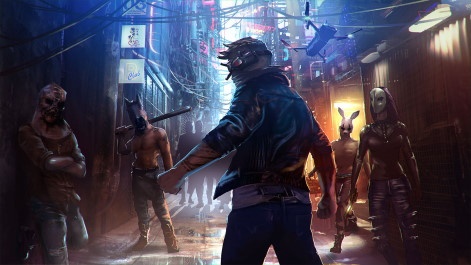
We’re really focusing on quality, innovative titles. And really with the mission of being a partner to developers, while giving them the resources to realise the full potential of the product. We don’t want to get in the way. We want to give them what they need to be successful.
What was your biggest challenge straight away?
Taking over from founders is always hard. Culturally and from a leadership style. They were awesome, and they ran a great business. But as the business evolves, the needs change of the business, and the industry changes. What we did three years ago wouldn’t necessarily work now. So bringing the team along on that journey has been the biggest challenge.
We’ve had to grow a lot in different areas, and flex different muscles. It’s building up a publishing organisation essentially from scratch. It’s gone from three or four people to now having a team of 34 people, and revenues have grown exponentially over the last three years.
We identified that Black game developers weren’t given support even to get something startedAlan Patmore, Humble Games
When we first started, especially on the Humble Games side, we were not what I would call a full life-cycle publisher. Essentially, we provided financing, and some light QA and release management, and maybe some localisation if people were lucky [laughs] – and very light touch marketing.
Now, we’re concept-through-live. We have full support from production and development support, localisation support, QA and marketing and PR and analytics – whatever it may be. We built all that up. And building that foundation has been challenging, but it’s also why I love the job.
Does that mean that you’re looking for game development partners at a very early stage? How do you go about talent scouting?
We have multiple sources. But we have a full sourcing team that is actively looking at content, always.
Early on, since we did not have a full remote production pipeline to support games, we were mostly investing in late-stage. Or we would look at Kickstarter and a game that was halfway through. They’d already been funded partially, and they needed finishing funds. They need to get it over the line.
But then, over the course of a year into my coming to Humble, we really started to shift. The investment profile changed. We started doing earlier-stage investments as we built up our capabilities.
We had a sourcing team that would start looking for and engaging with, developers much earlier in the pipeline. And then, as the brand became larger and known, we get a lot more inbound. But we do now have a three-person sourcing team that is looking at product constantly at all stages of development.
There are things like our Black Game Developer Fund, which opens up the funnel as well. When we started that, there was the George Floyd news. That was something that was really important to me. And this is one of the coolest things about Humble. And Ziff Davis, to a large extent, were all looking at the situation, and trying to figure out what we could actually do. What we identified was that it was really early in the life cycle, especially for Black game developers, that they weren’t given the support even to get something started. So that visibility on that has given us a big funnel of new content built by Black game developers that we can look at.
Have people been through that entire pipeline? Are there games from the Black Game Developer Fund available from Humble Games right now?
No, not yet. The majority of the games that we’ve funded – 30 games up to this point – are essentially starter funds. Our expectation is really to get people off the ground. It’s seed money to start a company.
Because that’s really the problem. A lot of Black game developers don’t have access to capital even to start. We’re doing a lot of starting funds. We have signed Protodroid DeLTA by Adam Kareem, which started off the fund, one of the original seven who joined the program in its first year. It now has a big publishing deal. We have high hopes for how well that game is going to perform.
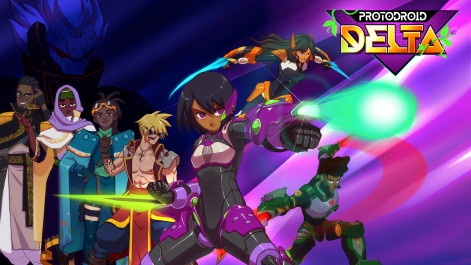
There are several games in the pipeline that have now got full published deals. We’re really not looking at this as a way to make money. It really is to get people off the ground. Even if they get to a point with the vertical slice where we choose not to publish it, and they want to take it to someone else, we see that as a win.
Do you think there’s a particular kind of game that defines Humble Games?
If you look at our portfolio, it’s pretty diverse. Midnight Fight Express just launched. That was one of the first games I signed, which is a very action-fluid fighter and brawler. Then we have Mineko's Night Market. It’s this lovely story based in Japan, and it’s very cute and very beautiful. So we’re looking for quality, and you’re able to afford it.
We’ve seen this through MetaCritic. Last year, we were number three. The year before that, we were number eight in terms of average review score for publishers. For a new publisher to hit that quality bar is a huge compliment in my mind. I’ve strived for 20 years in my career; you have to realise that!
The biggest constraint now isn’t capital. It’s discoverability. Our mission is to connect creators and developers with customers and charitiesAlan Patmore, Humble Games
It is really innovative, creative, high-quality product. But we’re not stuck with: “Oh, it has to be a narrative-based game.” We’re fairly genre-agnostic. But it is interesting: there’s something about Humble Games that checks all those boxes. There’s something innovative about them. They’re very creative. They’re either artistically unique, or something is different. Even the shooters we do! We did Prodeus. It was retro, Doom-like 3D. It had a unique angle, and as a game, it was high-quality.
What’s your take on the big trends at the moment? How do you navigate hot topics like NFTs?
I am not a big fan of NFTs or web3. I’ll tell you that Humble will not get into that space, probably because I don’t really see that there’s a tremendous amount of value for the customers, at least at this point in time.
I’m sure we’ve heard this from other people in the industry – to some extent, it’s a little bit of a Ponzi scheme at this point in time. There’s no practical application for purchasing even crypto. And I was very early in crypto, believe it or not! But I still haven’t seen the real-world, practical use of it.
And that is consistent with what I’ve seen in gaming. That’s not to say that in the future it couldn’t happen, but we’re not interested in that space now. I also think it’s something that’s being pushed by venture capitalists and things like that, and it’s not really driven by consumer demand. Or by the developers. So, yes: I’m not interested in that space.
Really, for me, where we see gaming going is to continue the democratisation of distribution. The biggest constraint now isn’t necessarily capital. There are multiple ways to get funding for games. It’s getting connected to the customer. It’s figuring out discoverability, and that’s where I think Humble is in a [good] position. One of our missions is to connect creators and developers with customers and charities.
I think that is at the forefront. But obviously, user-generated content is still a very big thing. We’re interested in games where users can express themselves. And AI is another big thing, and how that can impact both from a developer’s perspective and also from a customer’s perspective within the game mechanics.
I try not to get on the bandwagon of what’s hot. Really, the way we’re looking at the games, again, it comes down to quality and compelling content that really will drive our business. And that’s what I’m looking for.
I am not a big fan of NFTs. Humble will not get into that space, because I don’t see value for the customersAlan Patmore, Humble Games
From a customer perspective – and just as a gamer – it’s like: I care about quality. I want an engaging multiplayer experience or a single-player experience. And, yeah, could there be applications where blockchain or NFTs add value? Maybe, but I’ve yet to see it, and I don’t see any real reason why I would want to take a sword from one game to another game. There’s too much nuance in the mechanics and things like that. Maybe vanity items and skins and personalisation. But it’s very early days.
Didn’t Humble change its subscription approach this year?
We’ve evolved our subscription. The subscription market has changed a lot over the last three to four years. We were kind of the first people to have a subscription.
And our subscription is different. Ours is the subscribe-to-buy model. Meaning you get the games when you subscribe. Every month, you get a drop of games, and you get the keys, and they’re in your library, and you can play them forever.
Whereas a "game pass", which is a great product, is subscriber access. You get to access games, and some of the games will cycle out – you’ll have purchase them to continue playing them, or not. Our model is therefore different. And to be honest, we have felt that there is pressure from the other competitors: before, we were the only people in town, and we were the only offer, and now there are very high-quality new subscription services. We’ve had to adapt the service to meet our customers' needs.
We’ve evolved. I think it’s been two times since I’ve been here. We’ve shifted it to a choice model where you can choose which games you receive during that month, and then most recently, we changed it so that it is just, again, that you get eight games. We actually reduced the total number of games because our customers wanted a higher-quality, fewer number. We started to focus. There was a big shift recently, in March this year, to focus on quality in curation. Fewer, higher-quality games that really resonate with our customer base. Since that, we’ve seen a lot more success with the subscription product.
With great respect to everyone who suffered during the pandemic, the games industry had a profitable two years. Is that an experience that you had at Humble as well? And what about coming out the other side…?
Yes, 2020 was a very strong year for us, in different ways than we predicted and forecasted. There was a lot of demand for our bundles.
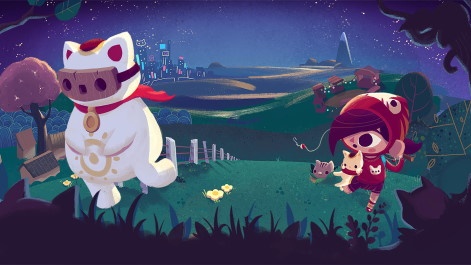
Also, it was the highest year for raising money for charity – unfortunately. Because we had not only the pandemic, but we had the BLM George Floyd situation. And fires in Australia, and there were a lot of global, catastrophic events for which we did our charity bundles. And that’s when we could get everybody – all the publishers and developers in the gaming community – together to pitch in to create these pretty epic bundles that we would then sell, and all the proceeds go to charity.
Most recently, we did the Ukrainian bundle. That’s by far the most successful bundle of all time. We did $20 million from that in like five days or seven days.
Our bundle business did really well [in 2020] because I think people saw a lot of value. They were staying at home, wanting to play games. You have these bundles that bring a lot of games to play for not a lot of money.
We’re having a strong year because there’s a dearth of products out there; all the big AAAs got pushed to 2023Alan Patmore, Humble Games
That was when we saw our publishing business really start taking off, and our subscription business did really well, too.
In 2021, post-pandemic, we did see a little bit of weakness. The majority of that was on the subscription side. We attribute that more to competitive pressures within the industry, and that’s, again, why we changed our subscription offering.
But the other side of the business – the bundle business – grew 65% year over year. And the publishing business is up… it might be 100% over the year! The publishing business is the fastest-growing part of our business. I’m not sure if the pandemic impacted it. We’re not seeing that much change in user behaviour on that side.
There are always different factors that impact our business because we’re in a really interesting space in the life cycle of a product. On one hand, we have a new product with Humble Games, but to a large extent, on the bundle side and the subscription side, we’re later in the life cycle of our partners’ wants. Monetising the back catalogue, and so on.
This year, we’re having a very, very strong year, not only because of Humble Games’ growth but because there’s kind of a dearth of new products out there right now. That benefits Humble Games because we’re releasing a lot of games in a pretty empty market right now. All the big AAAs got pushed to 2023.
But then, also, a lot of our partners are trying to figure out: "How do we sell more products through different channels?" We are one of those different channels. We’re benefiting right now from a little bit of the downward pressure a lot of the bigger companies are feeling – from the pandemic hangover, and from titles being pushed.
You mentioned this is sort of your redemption arc, working for Humble. How satisfying is it to be involved in helping during times like the Ukrainian crisis?
Incredibly rewarding. That is one of the primary reasons that I joined Humble. When I first got approached, I knew the impact they were having in the industry. I didn’t realise the scale of the company, and how big it was. It’s a very successful company. I thought it was a nice, little company that raises money for charity. But I saw the impact that they were having. As a matter of fact, the t-shirt I’m wearing; it’s a “$200 million raised” t-shirt. We broke that a year or so ago. We’re at, now, I think, $220 million or $230 million.
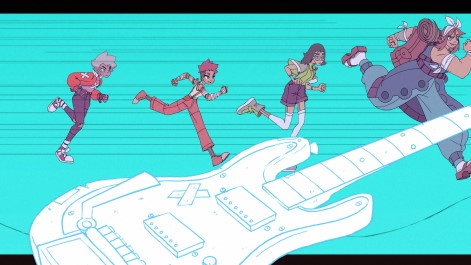
And I think the coolest part is the relationship we have with charities. They’ll send us videos, and they really show the impact that the Humble community is having on people. One of the best examples that really hit it home for me when I first started was charity:water, which we do a lot of work with. They build wells in Africa to give clean water to people that don’t have access to it. They do a great job of connecting the people that have donated to the actual impact that they’re having within the community. They created this video, and you can actually go on their website, and search for “Humble Bundle”, and see the wells, where they are, and how many gallons of water they’ve generated. You see that impact, and it literally brings tears to your eyes. And that’s across the board.
The coolest part is the relationship we have with charities and the impact that the Humble community is having on peopleAlan Patmore, Humble Games
You look at the Ukrainian bundle, where we raised $20 million. In fact, I’m amazed by the outreach of the industry as a whole. It’s raised hundreds of millions of dollars for the effort. A lot of other companies have done wonderful work. Those dollars have a massive impact. It’s something that connects everybody at Humble. We’re all very mission-driven. This is the most mission-driven company I’ve ever worked at, and the most value-driven company I’ve ever worked at. And that is incredibly rewarding.
You mentioned the word “community” there. Rather than just having customers, do people identify more with buying something from your service because they’re contributing in a way?
It’s definitely one of the factors. Obviously, people are getting great value [laughs]. We give great value. There’s no doubt about it. But in all the research, and all the user feedback that we get, the charity angle is a big part of it.
It’s interesting: we do have this community, and we don’t really yet have the tools to help facilitate or foster that community. It’s something that we’re actually working on in the long run. You know, I walk through the hall, and people see the Humble shirt, and they’re like, “I love what you do! I bought this bundle because I wanted to commit to this cause.” People do connect with that.
One of the things I wanted to do with the business is to help facilitate that community. Because I think there’s a lot of power in that, and there’s a lot of like-minded people that want to make a difference, and want gaming to be a positive – to have a positive impact on the world.
It’s been a busy couple of years for you. What's still on the to-do list?
Community is a big one. The thing that we’re really looking to do is to capture the synergy between our ecommerce platform and our publisher. As a matter of fact, we’re doing our first sort of test in this area, with Moonscars, which has been releasing day and date with our subscription.
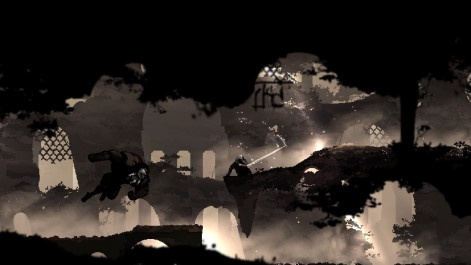
But we have this sort of content delivery system with the ecommerce platform, and the ecosystem and community attached to that. And then we’re creating this awesome content. It’ll better incorporate the two so that there’s an amplification effect between them. I think that is sort of our long-term vision, to create this flywheel where we have customers that come to the ecosystem, and we can move them through the whole life cycle of content, and they can purchase it in different ways. If they want to engage with it through a subscription, they can do that. If they want to buy it through bundles, they can do that. If they want to engage in Humble Games and play those day and date, they can do that. And they can do it the way they want. They can buy it at the store.
It’s creating that whole Humble ecosystem that is basically platform-agnostic and publisher-agnostic and will sell all types of content from indie to AAA. But then also our own content. We have that direct-to-customer relationship, and will then build a community within that, all supporting charity. That’s the vision. We have to build towards it.













